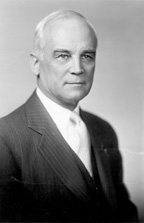Get Today in Masonic History into your Inbox. Sign up today for one of our email lists!
Need an article for your Trestleboard/Newsletter see our Use Policy
Harold Hitz Burton is Born

Today in Masonic History Harold Hitz Burton is Born in 1888.
Harold Hitz Burton is an American politician and jurist.
Burton was born on June 22nd, 1888 in Jamaica Plain, Massachusetts. His mother passed away when he was 18 and his father remarried. From his father's second marriage there were three half siblings of Burton. Burton went on to attend Bowdoin College where he played for the schools football team as quarterback. After Bowdoin, he attended Harvard Law School and graduated in 1912.
After graduating, Burton was married and the couple moved to Cleveland, Ohio where Burton opened up a private practice. In 1914, Burton went to work with his wife's uncle in Utah as the company attorney for the Utah Power and Light Company. He went on to work for Utah Light and Traction, Idaho Power Company and Boise Valley Traction Company. The last two companies were in Boise, Idaho.
When the United States entered World War I Burton joined the Army. He rose to the rank of captain during the war. He served in the infantry and saw heavy action in Belgium and France. He received the Belgian Croix de guerre. After the war he returned to Cleveland entered again into private practice. He also taught at Western Reserve University Law School.
In 1927, Burton entered politics when he was elected to the East Cleveland Board of Education. The following year he was elected to the Ohio House of Representatives. In 1929 he became the law director for the city of Cleveland. In 1932 he again returned to private practice.
In 1935, Burton was elected to serve as Mayor Cleveland. He was elected twice to the position. During his tenure as Mayor he worked continuing assimilation of immigrant populations, supporting industry in the city, and dealing with transportation needs. He decent and tasteful lifestyle and his opposition to organized crime gained him the nickname "the Boy Scout Mayor."
In 1940, Burton was elected to the United States Senate. He served only one term in the Senate in part due to making an ally of then Senator Harry S. Truman. Although Burton was a Republican , he and Truman got along very well. After Truman became President with the passing Franklin D. Roosevelt a vacancy on the United States Supreme Court opened up. The departing member of the court was considered a Conservative and Truman, in the spirit of bi-partisanship, wanted to appoint another Conservative to the court. Burton was nominated on September 30th, 1945, there were no hearings or debates and he was confirmed on the same day. He became the last serving member of Congress to be appointed to the court.
During his time on the court, Burton was credited by then Chief Justice of the United States Earl Warren with bringing unanimity to the Court during the landmark case of Brown v. Board of Education.
Burton suffered from Parkinson's disease later in life and passed away on October 28th, 1964 from kidney failure and pulmonary trouble.
Burton was a member of Pythagoras Lodge No. 682 in Cleveland, Ohio. He was also a 33° member of the Ancient Accepted Scottish Rite, Northern Masonic Jurisdiction and Al Koran Shrine Temple both in Cleveland.
This article provided by Brother Eric C. Steele.

